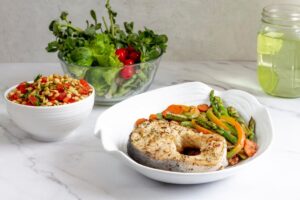The Health & Wellness Blog

30-Day Anti-Inflammatory Meal Plan for Healthy Ageing
Thrown in our fast-paced world, adhering to a healthy lifestyle is extremely important as we grow older. The food we feed our bodies is a key contributor to our health and longevity. The advantages of an anti-inflammatory diet over the long term have become accepted. This eating style centres around natural, nutrient-dense foods. These foods, too, encourage a reduction of what is known as chronic inflammation, a major contributor to most diseases of ageing.
This blog will guide you through a 30-day anti-inflammatory meal plan designed for healthy ageing. This plan helps you start your wellness journey or improve your habits. It gives you structure and inspiration to eat for vitality.
Why an Anti-Inflammatory Diet Matters
Inflammation is the body’s natural response to injury and infection. However, chronic inflammation, often caused by poor diet, stress, and environmental toxins, can harm your body over time. It has been linked to many conditions, including:
- Cardiovascular disease
- Type 2 diabetes
- Osteoarthritis
- Alzheimer’s disease
- Certain cancers
An anti-inflammatory meal plan can help reduce these risks and improve your resilience as you age.

What Makes a Diet Anti-Inflammatory?
The key to an anti-inflammatory diet is whole, plant-based foods rich in antioxidants, fibre, and omega-3 fatty acids. Important foods include:
- Leafy greens (spinach, kale, arugula)
- Colourful vegetables (broccoli, bell peppers, carrots)
- Berries (blueberries, raspberries, strawberries)
- Fatty fish (salmon, sardines, mackerel)
- Whole grains (quinoa, oats, brown rice)
- Healthy fats (avocados, nuts, seeds, olive oil)
- Anti-inflammatory spices (turmeric, cinnamon, ginger)
Skip refined carbs, sugary snacks, processed meats, and artificial trans fats. These foods can cause inflammation.
Key Benefits of a 30-Day Anti-Inflammatory Meal Plan
1. Improved Joint Health
Joint pain and stiffness are common as we grow older. Chronic inflammation aggravated these symptoms. An anti-inflammatory diet can help reduce the burden with foods that support joint function. Fish such as salmon and chia seeds contain omega-3 fatty acids, which can help alleviate arthritis-related joint pain. Turmeric contains curcumin, which has strong anti-inflammatory effects. It can work as well as some medications, but without the side effects.
Tip: To enhance absorption of curcumin, consider taking turmeric with black pepper up to 2,000%.
2. Enhanced Heart Health
Heart health is a growing concern with age. Chronic inflammation can lead to high blood pressure, high cholesterol, and arterial plaque. Foods that fight inflammation, such as walnuts, flaxseeds, olive oil, and dark leafy greens, keep arteries healthy. They also lower LDL (bad) cholesterol. Fibre-rich foods also support healthy blood sugar and cholesterol levels.
Bonus Benefit: Dark chocolate (70% cocoa or higher) may reduce oxidative stress and improve blood flow—just enjoy it in moderation.

3. Better Digestive Function
A healthy gut is vital for good health. As we age, our gut microbiota may change, leading to increased inflammation. Fermented foods such as kimchi, sauerkraut, kefir, and yogurt are rich in probiotics. These probiotics help keep gut flora balanced. Fibre from fruits, veggies, and whole grains helps good bacteria. This boosts digestion and cuts down on bloating.
Tip: Start your day with warm lemon water to aid digestion and support liver detox.
4. Cognitive Protection
Inflammation is linked to cognitive decline. A 30-day anti-inflammatory plan rich in polyphenols and omega-3s may protect brain health and memory. Berries can improve communication between brain cells and slow brain ageing. Eating green tea, nuts, and cruciferous vegetables may lower the risk of Alzheimer’s and other brain diseases.
What to Expect: Weekly Structure Overview
This 30-day plan is flexible, tasty, and sustainable. Here’s a general idea of how to approach each week:
Week 1: Detox & Reset
- Eliminate processed foods, sugar, and alcohol.
- Hydrate with lemon water, green tea, and herbal teas.
- Focus on fresh meals to ease digestive stress.
Week 2: Introduce Variety
- Add new anti-inflammatory spices and diverse veggies.
- Try plant-based proteins like lentils, chickpeas, and tofu.
- Incorporate smoothies with berries and flax or chia seeds.
Week 3: Build Balanced Plates
- Ensure meals include protein, healthy fats, and complex carbs.
- Use herbs like rosemary, oregano, and basil to enhance meals without extra salt.
- Practice mindful eating—slow down and chew thoroughly.
Week 4: Personalise & Sustain
- Reflect on which meals and ingredients you enjoyed most.
- Adjust portions and ingredients for long-term success.
- Prepare for life after the 30-day challenge by creating a list of favourite recipes.
Additional Expert Tips & Common Mistakes to Avoid
Best Practices
- Batch Cooking: Set aside time to prepare staples like roasted veggies, quinoa, and grilled proteins at the start of each week.
- Keep Snacks Simple: Go for almonds, hummus with veggie sticks, or apple slices with almond butter. Skip the processed snacks.
- Stay Active: Gentle exercises like walking, stretching, or yoga support your anti-inflammatory plan. They also boost joint mobility.
Mistakes to Avoid
- Neglecting Hydration: Water is crucial to flush out toxins and reduce inflammation.
- Overcomplicating Meals: Keep meals simple and focus on ingredients, not fancy recipes.
- Using Inflammatory Oils: Swap vegetable oil for extra virgin olive oil or avocado oil.
Advanced Insights / Expert Recommendations
Mind-Body Connection
Chronic stress can raise inflammation markers like cortisol and C-reactive protein (CRP). Meditation, deep breathing, and mindful eating can boost your anti-inflammatory diet.
Intermittent Fasting (IF)
Many older adults combine an anti-inflammatory diet with intermittent fasting. This helps lower oxidative stress and boost metabolic health. The 16:8 method (16 hours fasting, 8 hours eating) is popular. However, consult a doctor before starting IF, especially if you have chronic conditions.

Supplements to Consider
Whole foods should always be the priority. Still, some supplements can help support an anti-inflammatory lifestyle:
- Fish Oil (Omega-3s)
- Vitamin D3 (especially in winter)
- Curcumin with Black Pepper Extract
- Magnesium (for muscle relaxation and nerve health)
Sample 3-Day Meal Snapshot
Day 1
- Breakfast: Oatmeal with blueberries, chia seeds, and almond milk
- Lunch: Quinoa salad with spinach, chickpeas, and lemon vinaigrette
- Dinner: Baked salmon with steamed broccoli and sweet potatoes
- Snack: Greek yoghurt with walnuts and honey
Day 2
- Breakfast: Green smoothie with spinach, banana, flaxseeds, and coconut water
- Lunch: Lentil soup with turmeric and a side of mixed greens
- Dinner: Stir-fried tofu with ginger, garlic, and colourful vegetables
- Snack: Apple slices with almond butter
Day 3
- Breakfast: Avocado toast on sprouted grain bread with cherry tomatoes
- Lunch: Roasted vegetable wrap with hummus
- Dinner: Grilled chicken with roasted beets and a kale salad
- Snack: Dark chocolate (1 oz) with green tea
Embrace Healthy Ageing—One Meal at a Time
A 30-day anti-inflammatory meal plan is more than a diet; it’s a promise of healthy ageing and vitality. Opting for nutrient-rich foods is good for your body and helps combat inflammation. This enhances your energy and clarity. Results may not be immediate, but with time and consistency, the change becomes hard to ignore.
If you’re prepared to begin the next step to a healthier life, make small changes. Substitute processed snacks with whole foods. Incorporate anti-inflammatory spices in your diet. Tune in to how your body feels — and celebrate every positive change along the way.
It’s one meal at a time, and this is your journey. Are you prepared to fuel your future with foods that love you back? Start your 30-Day Anti-Inflammatory Challenge today and age with grace and strength.









